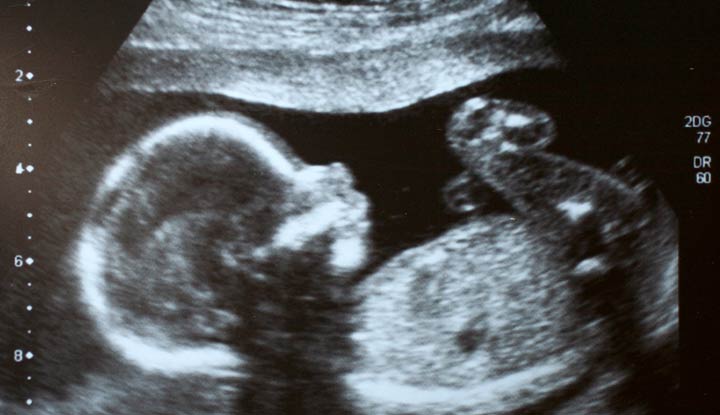A cryptic pregnancy is when you don’t know you’re pregnant. It can happen if you have irregular periods, don’t know the common signs of pregnancy or get a negative result on a pregnancy test.
Advertisement
Cleveland Clinic is a non-profit academic medical center. Advertising on our site helps support our mission. We do not endorse non-Cleveland Clinic products or services. Policy

Image content: This image is available to view online.
View image online (https://my.clevelandclinic.org/-/scassets/images/org/health/articles/24428-cryptic-pregnancy-91584560)
A cryptic pregnancy (or stealth pregnancy) is when you're pregnant but don't know it. It's even possible not to realize you're pregnant until labor begins.
Advertisement
Cleveland Clinic is a non-profit academic medical center. Advertising on our site helps support our mission. We do not endorse non-Cleveland Clinic products or services. Policy
It's most common to realize you're pregnant somewhere between four and 12 weeks of pregnancy. This could be because you have symptoms of pregnancy or because you missed your period. A positive result on a pregnancy test can confirm pregnancy. With a cryptic pregnancy, nothing triggers you to believe you're pregnant. This could be because you don’t have symptoms of pregnancy or mistake symptoms of pregnancy as a virus, or your pregnancy test result was wrong.
Anyone can have a cryptic pregnancy. You may be at higher risk if you:
Advertisement
Cryptic pregnancies are uncommon. Studies suggest about 1 in 475 pregnancies go unnoticed until about 20 weeks gestation. About 1 in 2,500 pregnancies go unnoticed until delivery.
You should still get a positive pregnancy test with a cryptic pregnancy. However, using an at-home pregnancy test correctly is the only way to get an accurate result. If you don’t use it correctly, you may get a false negative (meaning you’re pregnant but the test says you aren’t). Be sure to follow the instructions on the package and wait several days after your missed period to take an at-home test.
If your symptoms don’t agree with your home pregnancy test result, it’s always best to have a healthcare provider confirm pregnancy with a blood test.
No. A cryptic pregnancy is similar to a regular pregnancy in that you don’t get a true menstrual period. However, you may experience implantation bleeding or abnormal pregnancy bleeding and think it’s your period.
There are several reasons why you may not realize you're pregnant. Some of the causes are:
If you have a cryptic pregnancy, the symptoms are the same as those for a known pregnancy. The key difference is that you don't realize pregnancy is causing your symptoms. For example, you may think you're nauseous from eating a certain food or that you're tired because you need to sleep more.
Other symptoms of a stealth pregnancy include:
Advertisement
Most people realize they’re pregnant about 20 weeks into the pregnancy. However, it's possible to be unaware you're pregnant during the entire 40 weeks of pregnancy. There have been cases where a woman goes to the emergency room with pelvic pain only to discover she's in labor.
Some studies suggest cryptic pregnancies are more likely to result in preterm birth due to lack of prenatal care, poor nutrition or lifestyle choices.
Pregnancy care providers diagnose cryptic pregnancy like they would a typical pregnancy. Some of the ways providers confirm pregnancy include:
Treatment for cryptic pregnancy depends on when you realize you’re pregnant. If you’re still months away from delivery, a pregnancy care provider will try to catch you up on the prenatal care you’ve missed. This could include:
Complications of a cryptic pregnancy are a direct result of not knowing you’re pregnant. Some of those complications are:
Advertisement
Studies also show infants born from cryptic pregnancy are more likely to be born premature, which puts them at risk for poor growth or respiratory issues.
The best way to prevent a stealth pregnancy is to be aware of your body and sexual health. If you believe there’s any chance you could be pregnant, it’s always best to take a home pregnancy test or visit a healthcare provider for a blood or urine test.
Not knowing you’re pregnant is a real condition. In a cryptic pregnancy, you may go several months or the entire pregnancy without knowing you're pregnant. The best thing you can do if you’re sexually active is to know the signs of pregnancy and get a pregnancy test from a healthcare provider if you at all think you might be pregnant. Getting regular prenatal care is important for the health and safety of you and the fetus.
Advertisement

Sign up for our Health Essentials emails for expert guidance on nutrition, fitness, sleep, skin care and more.
Learn more about the Health Library and our editorial process.
Cleveland Clinic’s health articles are based on evidence-backed information and review by medical professionals to ensure accuracy, reliability and up-to-date clinical standards.
Cleveland Clinic’s health articles are based on evidence-backed information and review by medical professionals to ensure accuracy, reliability and up-to-date clinical standards.
From routine pelvic exams to high-risk pregnancies, Cleveland Clinic’s Ob/Gyns are here for you at any point in life.
